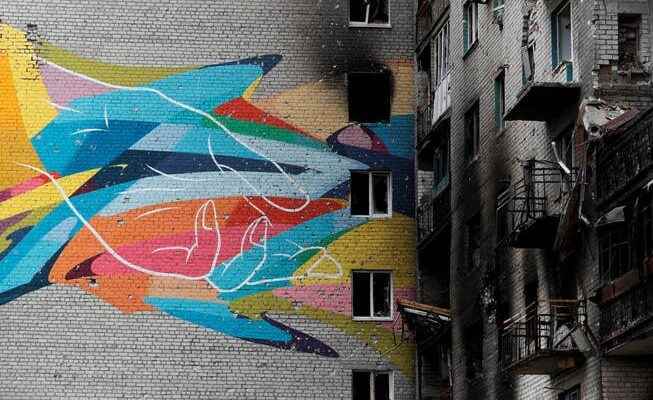The war is accompanied by increasing brutalization. This is reflected in the recent murders of Ukrainian prisoners of war. The Kremlin does not want to recognize its responsibility for this, on the contrary: for it, targeted terror is a means of power politics.
A crime against a Ukrainian prisoner of war is said to have been committed in the Russian-controlled town of Popasna, among others.
In the Russian-Ukrainian war, the fronts have been shifting only slowly for months. But this should not be confused with stability, and certainly not with rest. In the trenches, cannons thundered non-stop along the more than a thousand kilometers of front, and dozens of soldiers bled to death every day – nameless pawn victims in a power game played by the Kremlin ruler Putin that was unsurpassable in terms of cynicism.
What is frightening, however, is not only the intensity with which Russia is continuing its war of aggression despite all the setbacks, but also the increasing brutalization that goes with it. Recently, this has manifested itself particularly in dealing with prisoners of war.
climate of total impunity
Two weeks ago, pro-Russian Telegram channels circulated a video showing the castration and subsequent shooting of a Ukrainian prisoner. Research by the investigative organizations Bellingcat and The Insider led to the trail of the likely perpetrator, a member of the notorious paramilitary unit “Achmat” from the Russian republic of Chechnya. The crime was committed near Lisichansk, the industrial metropolis in the Donbass that was conquered by Russia in early July.
In early August, another testimony of unbridled violence circulated online – an image showing the head and severed hands of a man impaled on stakes. Here, too, everything points to a crime against a Ukrainian prisoner of war. The deceased was wearing a uniform, as further footage showed, and the horrific act took place in the middle of Popasna, a city that has been under Russian control for three months.
The humane treatment of prisoners of war is a cornerstone of international law. Russia has also committed itself to complying with the Third Geneva Convention, which regulates this in detail. Last but not least, the obligation to investigate such crimes and to punish the guilty is derived from this. However, the Putin regime systematically eludes this. The Kremlin even honored one of the units responsible for the Bucha massacre. Unfortunately, the murders described here are not isolated cases, but rather a climate of impunity created by the Russian state, in which bestial violence too often breaks ground.
The complicity of the highest political circles is also evident in the case of the Ukrainian soldiers killed in the Russian prison camp of Olenivka at the end of July. Moscow portrays the death of around 50 men as the result of a Ukrainian artillery attack – President Zelenskiy wanted to eliminate his own compatriots. The already bizarre thesis is invalidated by the fact that, according to weapons experts, the damage photographed in the Olenivka camp incompatible with artillery fire are. Instead, everything points to a deliberately caused major fire, i.e. a massacre of the hated soldiers.
In such a situation, it would be obvious to carry out a transparent investigation. But Russia’s leadership will not let the UN or representatives of the International Committee of the Red Cross into the camp, even though the latter is also an obligation under the Geneva Convention. The suspicion arises that Moscow sees the rampant violence and its propaganda exploitation on the Internet as a means of demoralizing the Ukrainian public. They are terror methods of a rogue state.
And the Ukrainians?
And the Ukrainians – don’t they have dirt on their hands too? Of course, there are also violations of the international law of war on the Ukrainian side. But it would be wrong to overlook the different dimensions and to pillory the two warring parties side by side. The human rights organization Amnesty International has rightly come under criticism because it recently press release accused the Ukrainian military of violating international humanitarian law with its conduct of the war, based on somewhat scanty facts. What was meant was the tactic of fighting out of built-up areas and thereby endangering civilians.
The military leadership has to show consideration for the population, and it does so, for example with mass evacuations. But the demand for a total abandonment of the use of urban areas in defensive combat is unrealistic. Modern wars are no longer fought in open battles as in the Middle Ages. If the Ukrainian troops confronted the Russian artillery devastation in open country, they would simply be slaughtered. Defenders often have no choice but to hole up in buildings. There is no evidence that they are using civilians as human shields – it would also be a useless tactic given the ruthlessness of Russian commanders.
It is legitimate to remind the Ukrainians of the rules of international law of war. But we must not forget who is the aggressor and who is the defender in this conflict, and that Russia is guilty of incomparably more crimes. The biggest of these lies in Putin’s decision to launch an unjustifiable war of aggression, with which Russia has placed itself outside any international order.
